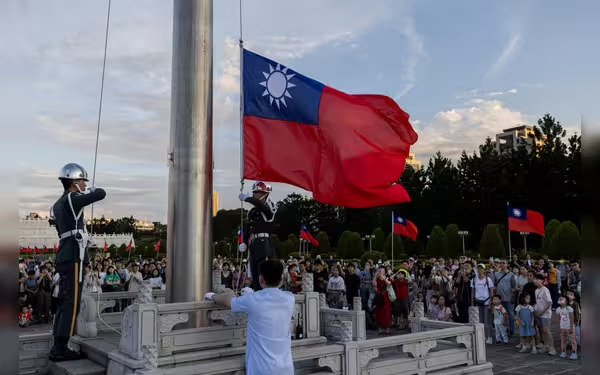Saturday, November 16, 2024 07:40 PM
Taiwan Alerts as Chinese Aircraft Carrier Approaches
- Taiwan's military on alert amid Chinese carrier presence.
- U.S. warns China against provocative actions towards Taiwan.
- Taiwan vows to resist annexation amid rising tensions.
 Image Credits: arabnewspk
Image Credits: arabnewspkTaiwan remains on alert as China's Liaoning aircraft carrier approaches, raising military tensions and prompting U.S. warnings.
In recent years, tensions between Taiwan and China have escalated significantly, with military activities intensifying around the self-ruled island. Taiwan, which operates independently, has been on high alert due to the increasing presence of Chinese military forces in the region. This situation has become even more pronounced with the detection of a Chinese aircraft carrier, the Liaoning, moving into waters near the Bashi Channel, as reported by Taiwan's defense ministry.
On Sunday, Taiwan's defense ministry confirmed that the Liaoning aircraft carrier group was spotted to the south of the island. The ministry stated, "China’s Liaoning aircraft carrier group has entered waters near the Bashi Channel and is likely to proceed into the western Pacific." In response to this development, Taiwan's military has declared that it is "on alert, prepared to respond as necessary." This readiness reflects the ongoing concerns about China's military maneuvers and the potential threats they pose to Taiwan's sovereignty.
The backdrop to this heightened military activity includes a recent warning from U.S. State Secretary Antony Blinken, who cautioned China against engaging in any "provocative" actions regarding Taiwan. This warning came shortly after Taiwanese President Lai Ching-te delivered a speech during the island’s National Day celebrations, where he emphasized Taiwan's determination to "resist annexation" by China. Lai's remarks have been met with strong disapproval from Beijing, which labeled him a "separatist" and warned that his "provocations" could lead to "disaster" for the people of Taiwan.
As the situation unfolds, it is crucial to understand the implications of these military movements and political statements. The presence of the Liaoning aircraft carrier not only signifies China's military capabilities but also serves as a reminder of the delicate balance of power in the region. Taiwan's commitment to maintaining its independence is clear, but the path forward remains fraught with challenges. The international community is watching closely, as any misstep could have far-reaching consequences not just for Taiwan and China, but for global stability as well.
The current state of affairs between Taiwan and China underscores the importance of dialogue and diplomacy in resolving conflicts. As both sides navigate this complex relationship, it is essential for the global community to advocate for peaceful solutions that respect the rights and aspirations of all parties involved. The situation remains dynamic, and continued vigilance will be necessary to ensure that tensions do not escalate further.













